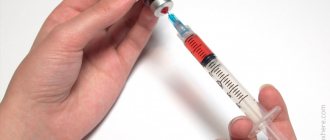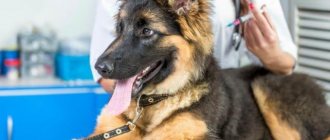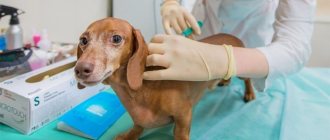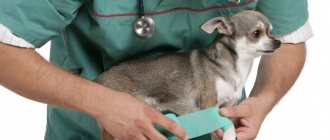A miniature, affectionate and cute Chihuahua is a pampered creature accustomed to comfort and warmth.
The immunity of dogs of this Mexican breed is quite fragile and susceptible to infections.
Will vaccination help? At what age should you get your first vaccinations? What diseases should Chihuahuas be protected from?
Read our article!
Why do you need to vaccinate your dog?
Chihuahuas are rather fragile dogs with weak immunity. Therefore, they, like representatives of other miniature breeds, are susceptible to many viral diseases. Some owners think that if the puppy lives in an apartment and relieves itself there, it does not need vaccination. This is a big misconception: family members can easily carry a serious infection with their shoes.
Purpose and functions of vaccination for Chihuahuas:
- Vaccinating your puppy significantly reduces the risk of contracting severe infections. Many of them are fatal to sneezes.
- Reduce mortality during pet illness.
- The dog receives the right to participate in dog shows and be with the owner on public transport.
- Protects the immune system of an elderly dog. With age, the health of sneezes inevitably weakens, so any disease becomes potentially dangerous.
Why is polio dangerous?
Most infections (>95%) are asymptomatic, but antibodies are produced. If there are signs of illness, there are different pictures of the disease:
· Abortive polio: inflammation of the gastrointestinal tract (gastroenteritis), fever, nausea, sore throat, muscle pain and headaches without central nervous system involvement.
· Non-paralytic poliomyelitis (aseptic meningitis): inflammation of the meninges without paralysis.
· Paralytic polio (1 in 200 infections) with typical symptoms of paralysis: independent breathing may become impossible and lifelong use of mechanical ventilation may be required. Paralysis can also lead to death.
Even decades after infection, post-poliotic syndrome may occur. There is no cure for polio. Only symptomatic therapy is prescribed to eliminate discomfort.
Chihuahua vaccination schedule for up to one year
Vaccinations for Chihuahuas are done based on a special vaccination calendar, which was developed specifically for the breed. As mentioned above, your pet should be vaccinated from childhood. Babies are much more vulnerable than adults.
Chihuahua vaccination table by age:
| Dog age | Name of the drug administered |
| 2 months (8 weeks) | At this age, the puppy is administered “Nobivac Lepto” or “Nobivac DHPPi” |
| 3 months (12 weeks) | Revaccinate the puppy with the same drugs |
| 6-7 months (30 weeks) | The puppy is injected with “Nobivac DHPPI” or “Nobivak Rabies” |
| One year | The baby is vaccinated against rabies with the drug “Eurican LR” |
The first vaccine, which is given at two months, prevents the development of:
- plague;
- parainfluenza;
- enteritis;
- leptospirosis.
The second vaccine consolidates the results after the first vaccination. The third is done when the dog’s teeth are completely renewed, that is, at 6-7 months.
The rabies vaccine is not given before the baby is one year old, since Chihuahuas are difficult to tolerate it at an early age. The medicine "Eurican LR" is effective for almost three years, but due to the aggressiveness of the disease, revaccination is necessary every year.
After the dog turns one year old, it must be brought in for booster vaccinations annually throughout its life. It is not advisable to miss your vaccination date.
General concepts
There are a few things to consider before vaccinating your Chihuahua. The most important rule when vaccinating is that the pet must be absolutely healthy. After all, vaccination is not a treatment, but a causative agent of the disease. Such an event can kill a dog with a weakened immune system. You should also not vaccinate a pregnant dog.
Don't rush into vaccination, otherwise it may simply not work. The immune protection the puppy receives through its mother’s milk disappears gradually. After this, the Chihuahua exhibits its own defense. If you get vaccinated too early, the risk of disease will increase.
Ten to fourteen days before each vaccination it is necessary to carry out deworming, that is, driving away worms. Otherwise, the vaccine will not work. The first time this procedure is done at three weeks, the second time at five weeks, the third at ten weeks. In the future, it must be repeated every three months. For this purpose, we can recommend the Drontal Junior suspension or Pratel tablets. The drug should be given to the Chihuahua in the morning on an empty stomach. The instructions included with the medicine will help you calculate the prescribed dose.
The first and second vaccinations should be given with the same drug. Always check the expiration date of the vaccine. Read the instructions to find out how to properly store the drug so that it does not lose its properties. Also read about possible complications in a dog after an injection.
Begin checking your Chihuahua's temperature three days before each vaccination. Thirty-nine degrees is the normal temperature for a dog.
The day before vaccination, you should not wash your dog.
What vaccinations can I refuse?
In connection with recent events, scientists have developed a canine vaccine against coronavirus. But most dog handlers and experienced breeders do not recommend giving it to your pet. There are two reasons for this:
- firstly, it provides only limited protection to the puppy;
- secondly, the disease is considered relatively mild; dogs with coronavirus do not have noticeable symptoms. Signs of the viral disease appear exclusively in tiny puppies that are under six months old.
Therefore, refusing to vaccinate Chihuahua puppies against coronavirus is completely justified. There are no obvious reasons why a sneeze vaccine should be given.
Another disease that some owners of Chihuahua puppies refuse to vaccinate is leptospirosis. The fact is that the infection is transmitted when the animal comes into direct contact with infected elements, for example, soil or water, feces and urine. Even fleas and ticks can carry the infection. And no modern veterinary drug can protect the Chihuahua from more than 200 species of the causative agent of leptospirosis. Another argument in favor of refusal is the frequent complications in puppies after vaccination.
Other vaccinations, including rabies, are mandatory for a Chihuahua puppy.
Is it possible to change the vaccine?
Sometimes, due to relocation or difficulties in importing the drug, the previous vaccine cannot be found. Some owners in this situation are afraid to use another drug. However, there is nothing wrong with that.
Vaccines acting against the same infections are interchangeable. For example, if a puppy was vaccinated with Multican, but at the time of revaccination this was not available at the hospital, then you can be vaccinated with the Nobivak vaccine.
Annual revaccination can be carried out with the drug that is available. It is not necessary to always stick to one manufacturer.
How to prepare a puppy for vaccination?
First of all, you must pre-register for vaccination. Having agreed with the veterinarian on a specific date and time of the appointment, you can begin preparing your pet. So, the preparatory activities are as follows:
- 10-14 days before the vaccination (no matter what it is), it is necessary to worm the Chihuahua puppy. The fact is that worms interfere with the proper absorption of antigens, thereby greatly reducing the effectiveness of vaccination. Another reason why you need to worm your dog is to increase the risk of adverse reactions and post-vaccination complications. Recommended drugs are Drontal Plus or Procox.
- You also need to treat your puppy for fleas 10-14 days in advance.
- On the day of vaccination, you need to feed your pet as fully as always.
- Three hours before vaccination, you need to measure the puppy's temperature. Its increase may become a contraindication to vaccination.
- It is necessary to examine the mucous membranes of the Chihuahua puppy and assess its health condition. It is necessary that the dog is completely healthy.
Some veterinary clinics offer home-based vaccinations. This is much more convenient than taking a Chihuahua puppy to the clinic and subjecting it to unnecessary stress. But before inviting a specialist to your home, you need to make sure that the clinic has a license.
approximate cost
Some owners who know how to administer vaccinations save on a visit to the veterinary clinic and administer the injections themselves, using a small syringe and drugs purchased in advance at a veterinary pharmacy.
This should only be done if you are absolutely confident in your own abilities and that it will not harm the dog in any way. In other cases, it is better to contact a qualified specialist.
The final price for the vaccination procedure is determined depending on:
- vaccine manufacturer companies;
- pricing policy of the veterinary clinic;
- region of the country;
- reputation of the veterinary clinic and its status (private or public).
On average, each vaccination for a Chihuahua costs from 150 to 300 rubles.
Caring for your dog after vaccination?
In the first two weeks after receiving the vaccine, the Chihuahua’s body begins to adapt to the administered drug. Immunity to infectious diseases is gradually developed. During this quarantine period, several rules must be followed:
- Do not take the puppy outside. This is a strict prohibition specifically for puppies who sneeze. After revaccination of an adult dog, quarantine is also required, but some veterinarians allow short walks with them in warm, dry weather.
- Chihuahuas should not be allowed to come into contact with other dogs or other animals. They are potential carriers of infection.
- Do not allow your pet to become hypothermic.
- Do not expose to emotional stress or physical overload.
During the first seven days of quarantine, you should not wash your Chihuahua. Water can cause a sneeze to catch a cold, especially if he has short hair. If there is any deterioration in health, you need to show your four-legged friend to a veterinarian.
What to do if you missed it
First of all, you need to consult a specialist who will give recommendations on further actions.
If the absence was no more than 14 days, then a single vaccination is performed. If there is a significant delay, you need to apply the puppy schedule. In this situation, subsequent revaccination will be performed.
Consequences if you don't do it
If you ignore veterinarian recommendations regarding vaccination, then adverse consequences may develop for your dog.
This increases the risk of developing many infectious diseases that pose a danger to both the lives of four-legged animals and humans.
Possible consequences and complications after vaccination
Modern veterinary drugs used to vaccinate dogs are effective and safe. However, in individual situations, Chihuahuas experience certain side effects after the injection. These include:
- the appearance of swelling at the injection site, redness and pain when pressed;
- the dog refuses to eat;
- constant drowsiness, decreased physical activity;
- slight increase in temperature.
All of the above symptoms will disappear in the Chihuahua in the first two days after the vaccine. There is no need to take any urgent action. The main thing to do is to look after the baby and caress him more often.
If the owner notices that the Chihuahua is beginning to develop an allergic reaction, then you need to give him an antihistamine. For example, Suprastin. The dosage must be selected taking into account the weight of the dog.
Very rare, but it is possible to develop more severe consequences after vaccination. The following manifestations require urgent contact with a veterinarian:
- anaphylactic shock;
- severe intoxication of the body: nausea, incessant vomiting;
- labored breathing;
- severe itching all over the body;
- swelling of the dog's face and neck;
- allergic skin rashes.
If your pet remains lethargic and weakened for more than two days after vaccination, you should also show him to the veterinarian. Perhaps the dog already had health problems before vaccination.
Post-vaccination quarantine
After vaccinating a Chihuahua, the owner should observe a number of restrictions aimed at maintaining the dog’s health and serious consequences. The duration of quarantine is 2 weeks.
The dog should not be allowed the following:
- stay outside (walk);
- contact with other animals;
- wash and bathe;
- scratch the injection site.
In addition to observing the precautions listed above, it is important for the owner to prevent hypothermia of the animal’s body and drafts, which is most important in the winter season.
Also, during the quarantine period, you should not overload the animal with active physical activity.
Do you keep your Chihuahua dog up to date on vaccinations? What vaccines do you use and why? Please share your opinion and experience in the comments below the article.
Warning for the unvaccinated
The stated goal of the World Health Organization (WHO) is to eradicate polio, and Russia is also committed to this goal. However, polio is still found in Pakistan, Afghanistan or Nigeria and can also be carried by tourists into the Russian Federation. Therefore, polio vaccination is still recommended, important and necessary.
Everyone should be vaccinated against polio, ideally as early as infancy. People who were not vaccinated as children, or whose vaccination status is unknown, should catch up on polio vaccination.











